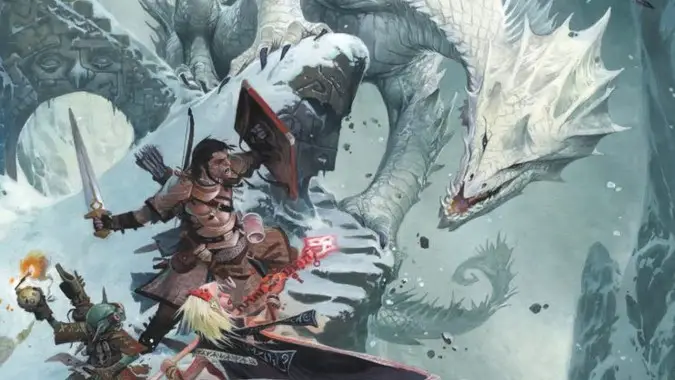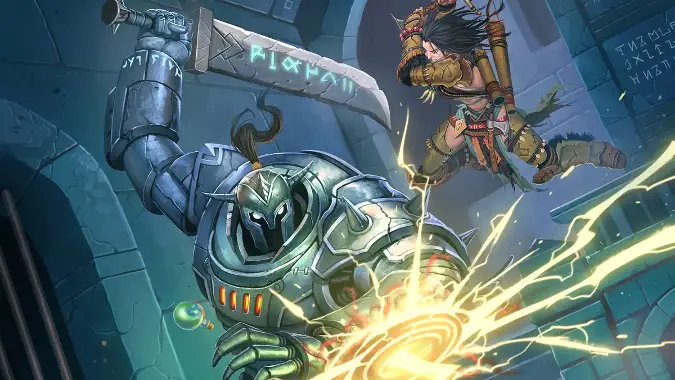How to improvise while DMing Dungeons and Dragons

Here’s a little secret — I don’t do a lot of formal planning for running my D&D games.
Oh, I have notes, and an overall story, but I have made it a rule to keep myself as flexible as possible. The difference between playing a game of Dungeons and Dragons and telling a story — even another collaborative story — is the random element. Not only do I not know what the players are going to do, I don’t know what the dice are going to do. The party’s Bard might come up with a really great idea to impersonate a guard, only to roll absolutely terribly and end up not even coming close to succeeding. There’s no way to predict what’s going to happen, and that’s okay.
There are various ways to handle improvisation as a Dungeon Master. I’m going to talk about some of them and help you decide which one works for you, your players, and the game you’re trying to run. These tips are not limited to D&D — any RPG you run, you’ll eventually have to deal with your players having their own ideas and having to improvise.

Maybe you’re into planning
Some DMs deal with the game going in an unforeseen direction with rigorous and extensive planning. I have known DMs who plan for every possible outcome, like Grant Morrison’s version of Batman with every contingency accounted for. If the party decides they want to explore Fulson’s Doom instead of heading on to the capital, they’ve already got the whole place written up and ready to go.
There’s nothing wrong with this, and even though I just said I don’t do a lot of formal planning, I do try and have ideas ready for when the party departs from what I’d expected them to do. Sometimes I get extremely lucky, and sometimes I need some NPCs fast. Having a detailed plan for what to do if something happens you weren’t expecting is, in a way, expecting it — it’s not for every DM, but if you’re that kind of person it will make you look like an absolute genius.

How to play Yes And… at the table
One of the big ideas of improv theatre that you can adapt to DMing is the concept of saying yes, and… when presented with something you didn’t expect or account for. Your players decide they would rather stay in Fulson’s Doom? Don’t say, “wouldn’t you like to stay in the capital I’ve meticulously constructed for your benefit?” Say yes, and… Maybe make them do the work of figuring out what they want to do there. Switch into something I like to call observation mode — tell them what they see and hear, watch to see what they do, and then react to it. If they just go to the local inn or tavern, you can subtly steer them towards either taking some actions (maybe that eventual bar fight every D&D game I’ve ever run will happen) or just sit back and watch as they go to shops, ask about selling all the junk they’ve picked up over the campaign, and otherwise take a session to do all that stuff that doesn’t seem all that important to you but which is clearly important to them.
Plus you can work in that there’s a cult in Fulson’s Doom that lives in the sewers and sneaks out to eat people’s brains and see if they take the bait. But remember, don’t just forbid them. It’s a really bad idea to tell people they can’t do something. You can tell them that it would be a very bad idea to sneak into Duke Fulson’s bedchamber, that he’s got tons of guards and his keep is huge and well secured and there’s a court magician warding the place, but if they’re absolutely determined to do it? Let them try. After all, the DCs are yours to determine, and it could end up being the best session of your game ever when they manage to sneak all the way in only to get caught in the kitchen because the Rogue rolled a 2 on Stealth.
This is always an added factor in your plans — you can never count on the party to succeed. The dice decide a lot in any RPG, and you need to be ready for that as well. When the party is brought in chains before the Duke, what do you have him do? You didn’t even know this was a possibility when you set up this adventure — you were expecting to be in the mountains hunting an undead mind flayer by now.

Making it up as you go
Okay, so after last session, you’d planned for the party to stop at Fulson’s Deep, resupply and take a long rest, and then head back out in pursuit of the Alhoon Xerebrachtis who’s endangering all of Alron with his plots. However, after several stressful encounters, the party decides Fulson’s Deep seems pretty inviting. They loved the accent you did for Kahri, the scarred up one-eyed Dwarf barkeep and they decide they want to go explore the town. You didn’t really have much prepared for the town — just the Snuffling Boar tavern, really.
There are various ways you can handle this. One is to simply write down or otherwise take notes as you create NPCs for the players to interact with, such as Smiling Jim the Lizardfolk Druid who runs a local alchemy hut and garden grove. Doing this kind of work on the fly can be fun as you’re forced to come up with hooks into the characters you’re presenting really quickly, and you can then expand upon them if the party seems interested in those characters. Maybe Smiling Jim has a problem, one of his suppliers out in the mountains has stopped sending him the herbs he needs and he asks the party to go check it out. You know that you’ve literally just decided that Xerebrachtis is somehow behind Jim’s troubles — Xerebrachtis could’ve been behind any issues you would’ve encountered in town. It’s a fast way to get the party back on track while it also gives them some agency and lets them make a new contact who might show up later.
Trust me, when Smiling Jim shows up 10 sessions later and helps the party deal with a family of Manticores attacking Fulson’s Doom, the place will feel lived in to them.

Accept their decisions and make them work for you
So your campaign, which you’d expected to be a long chase across the continent, has become set more or less in Fulson’s Doom. You didn’t intend this — the place was expected to be a one stop on the trail, but after saving Jim’s herb suppliers the Wildland Elves, fighting the Cult of the Brain Eaters in the sewers, and returning to the city several times to sell treasure from other adventures they’ve more or less become fixtures. They’re on a first name basis with the Head of the City Guard and the Mayor due to their heroics.
Embrace this. Use it to propel future stories. The party wants to be important in Fulson’s Doom? Great. Now they’re the ones everyone expects to save the day. Use previous adventures to spark new ones — it turns out the tomb of the undead beholder god Kkarklashton that Xerebrachtis was seeking was build deep underneath Fulson’s Doom. In fact, while you’re working on this idea, you realize that Fulson was in fact an ancient adventurer who died defeating Kkarklashton, and his doom was quite literally the undead beholder itself — the city was originally built by his surviving party and their ancient arms and armor are buried in the tomb below the city to be used against the monster should it ever rise again.
None of this was planned by you. But you listened and let your players make decisions about what their party was going to do, and now they think you’re a genius who set up this whole thing. Go ahead and let them think that. It’s totally okay. DMing is a lot like herding snakes, so when you manage to get all of them slithering in the same direction, just let yourself feel good.
Originally published 3/31/2020. Updated 8/6/2021.
Please consider supporting our Patreon!
Join the Discussion
Blizzard Watch is a safe space for all readers. By leaving comments on this site you agree to follow our commenting and community guidelines.
 @MatthewWRossi
@MatthewWRossi



